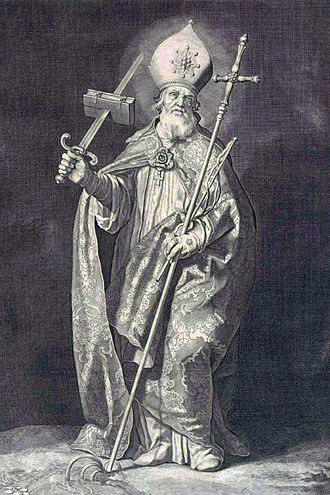It happened today - June 5, 2016
 To quote Saint Boniface, “Arghk thud.” Or something like that. For on June 5 of 754 AD he was killed, with 52 others, by pagans in Frisia to whom he was explaining that “dead-Jewish-carpenter-is-God” thing I’ve commented on previously. Where did anyone find the nerve to go tell guys with nicknames like “Blood-axe” and personal histories to match to stop worshipping bloodthirsty deities and start being nice to one another for a change?
To quote Saint Boniface, “Arghk thud.” Or something like that. For on June 5 of 754 AD he was killed, with 52 others, by pagans in Frisia to whom he was explaining that “dead-Jewish-carpenter-is-God” thing I’ve commented on previously. Where did anyone find the nerve to go tell guys with nicknames like “Blood-axe” and personal histories to match to stop worshipping bloodthirsty deities and start being nice to one another for a change?
OK, OK, I know where they got it in once sense. Devotion to Christ and in some cases visions, whatever you think of their authenticity. But bear in mind that St. Boniface was not a guy in a painting or a statue back then. He was an actual person who had to get into a ship one leg at a time on the clear understanding that they were going to sail east across the North Sea, if they did not sink, to a place where people who found torture amusing would consider them dangerous weak idiots. It must have been tempting to say “Hang on chaps, I forgot something, you go without me,” or “The weather looks iffy, let’s do this in, say, about 15 years” or “Maybe we should just go reconnoitre a bit, not really lay it on too thick about Jesus to start.” But they didn’t.
Now it’s an interesting footnote about Boniface, who was in fact born with a name along the lines of Winfrid, Wynfrith, or Wynfryth in Alfred’s Wessex long before there was an Alfred, that at the time of his death he was somewhere near 80 years old. Whatever other excuses he might have made but didn’t, stalling for a decade and a half wasn’t one.
So don’t believe everything you’ve been told about the Dark Ages. Yes, life expectancy was low. But it’s a statistical thing. Because so many people died in early childhood the average age of death was far below what it is today. But once you hit 20, you could have a long and even a full life worthy of admiration.
He certainly did, reforming the Frankish church, being the first archbishop of Mainz, and promoting links between the Carolingians and the papacy for many years as well as carrying out a number of these perilous missionary missions before the one that brought his career to a dramatic close and saw him canonized, lionized, and made patron saint of Germania.
Of course you can take a dim view of almost anything he did including promote Roman Catholic Christianity. But you can’t brush him aside. His was a long and remarkable career and his death underlined the extent to which he had the courage of his convictions to a striking degree.
Who of our modern prattlers would dare undertake such a thing?